Aug 10, 2024 – Farm Work, Korean Minutemen for Peace and Unification Assembly
Good morning. Dawn has broken at the Dubuk Jungto Retreat Center. After finishing morning practice and meditation, Sunim put on his work clothes, which he hadn’t worn in a while.
The sun was just rising through the thick fog. After inspecting the rice paddies and fields, Sunim went to the greenhouse. The peppers were ripening day by day, and since there was a shortage of workers, Sunim also picked peppers.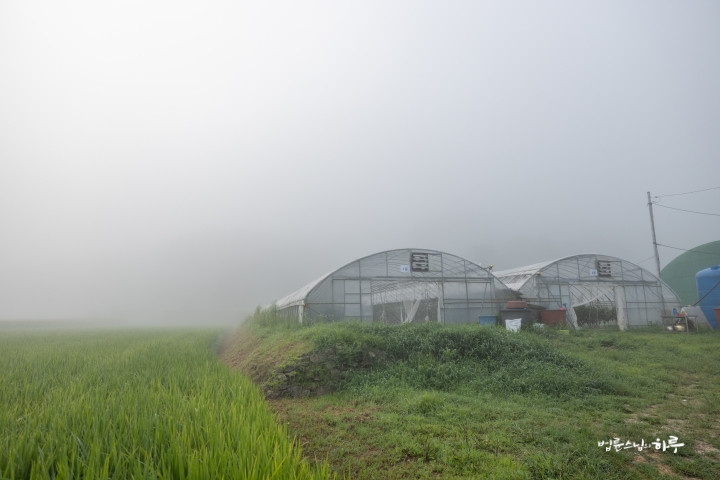

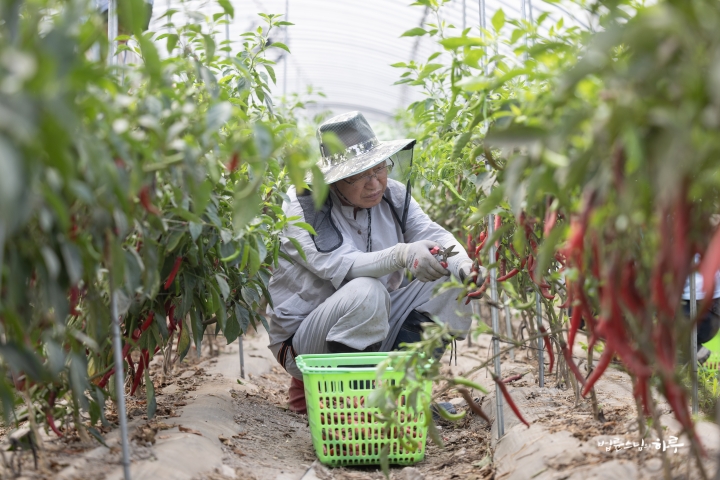

Three volunteers who had departed from Busan soon arrived to help with the harvest. They went to the end of the greenhouse and came out to the outside, harvesting peppers together.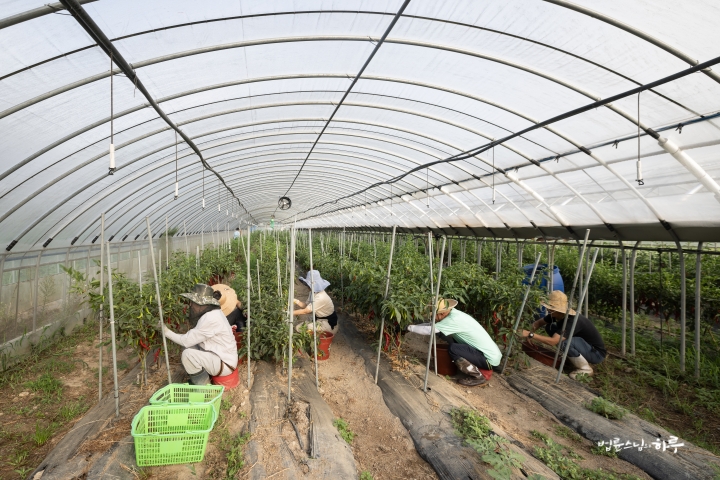
“Where are you from?”
“We’re from Seo-gu, Busan.”
“You must have left early this morning.”
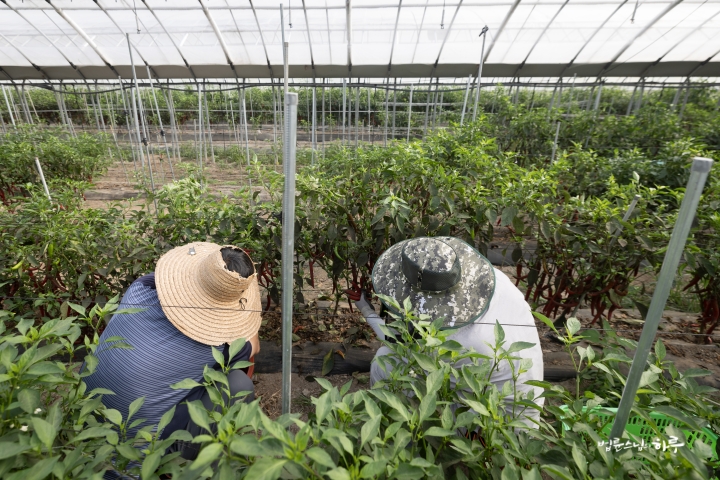
While they were picking peppers, a clear bell sound rang out. Everyone stopped their movements and closed their eyes where they were. They meditated for one minute.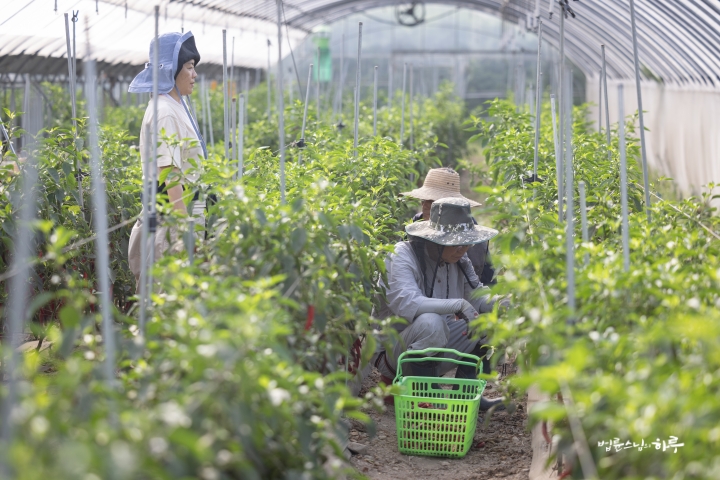
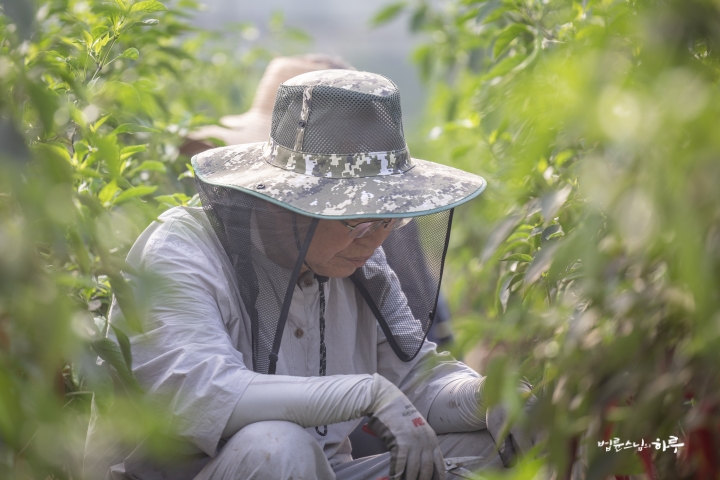
When the bell rang again, they opened their eyes and resumed harvesting peppers.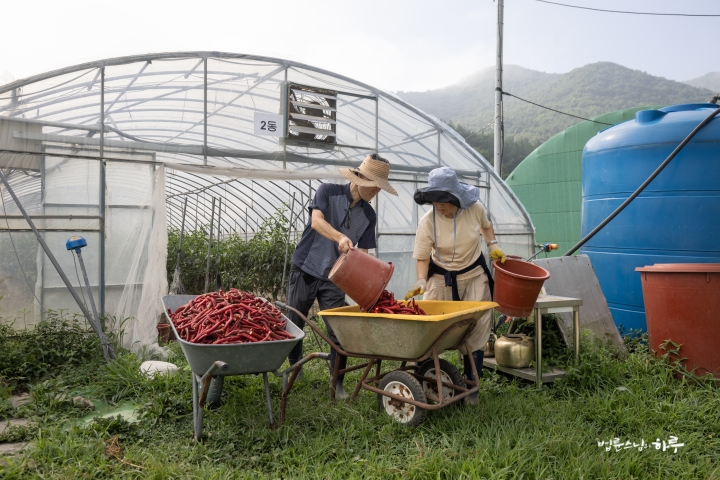
Four laymen also arrived to mow the grass with weed trimmers.
“Thank you!”
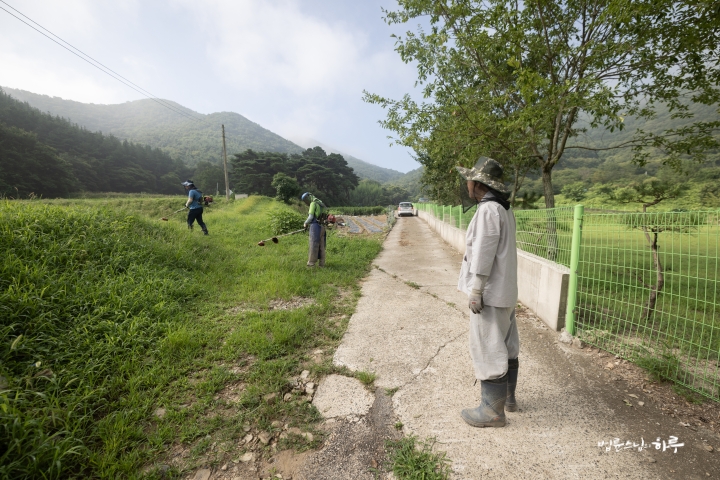
Sunim put on an apron and hat to use the weed trimmer as well, but it wouldn’t start. So he cleared away farming materials to avoid interfering with the weed trimming.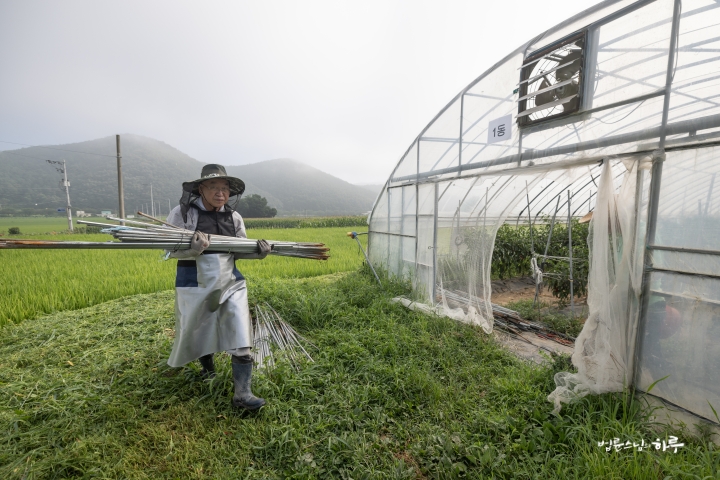

After clearing away the farming materials, Sunim went to the vegetable garden. The Korean cabbage and young radish greens he had planted in the spring before his overseas trip had grown abundantly. He first harvested all the Korean cabbage from the front garden.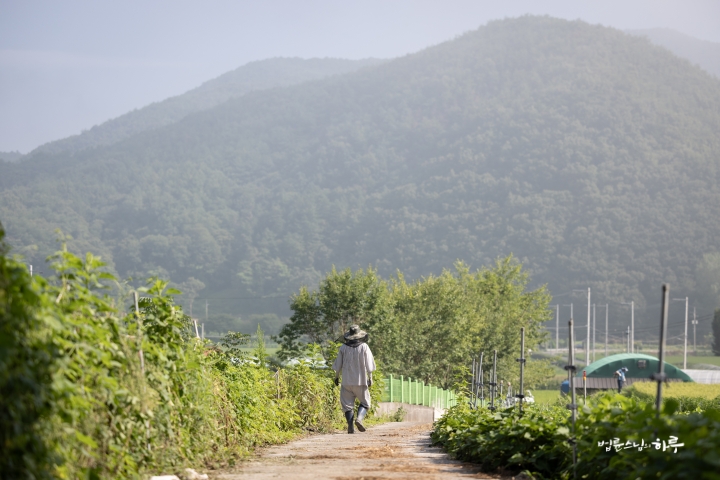
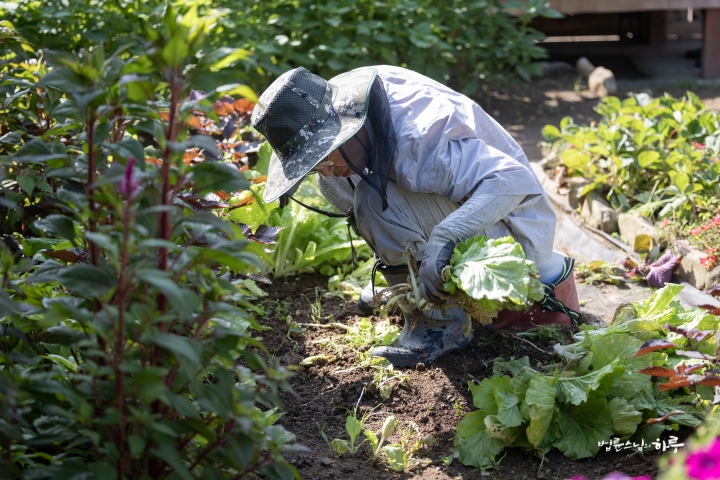
He also harvested all the Korean cabbage and young radish greens planted in the back garden.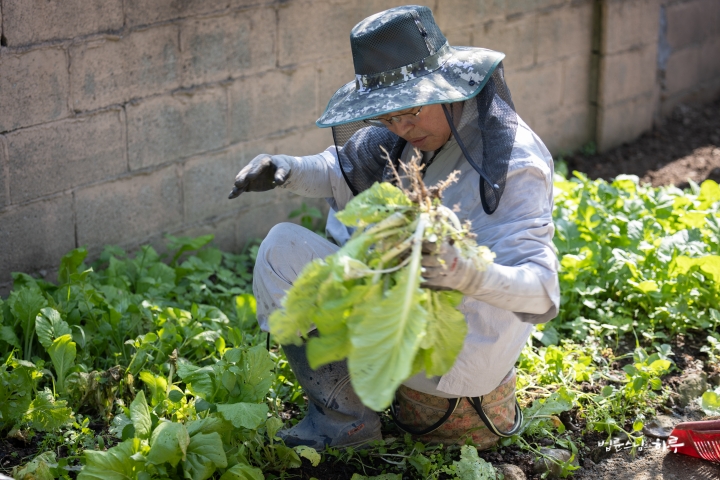
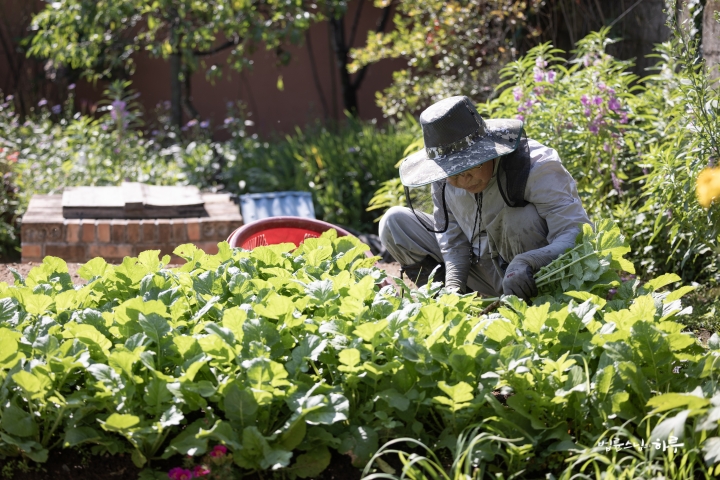
He then turned over the empty soil well with a hoe.
“Now we should plant fall cabbage and radishes”
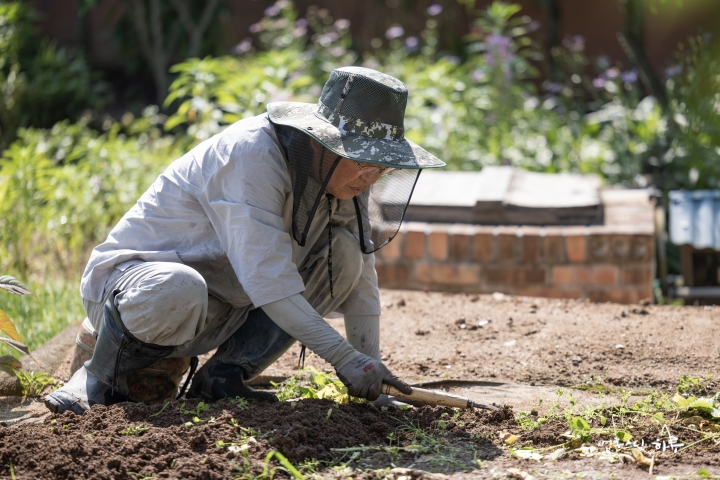
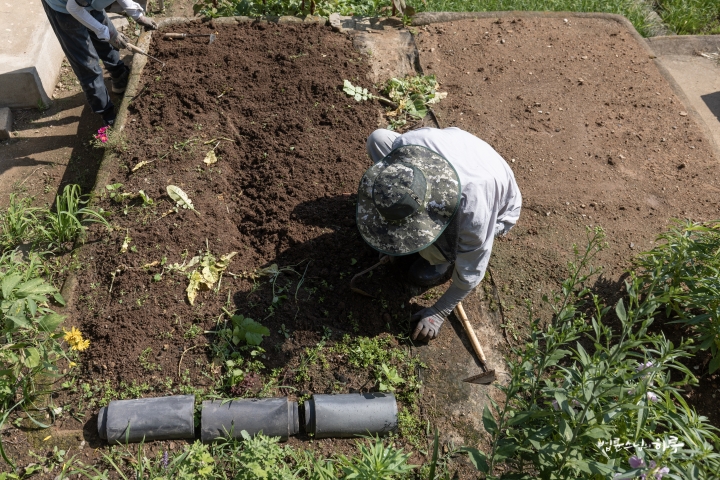
They immediately made kimchi with the harvested Korean cabbage and young radish greens.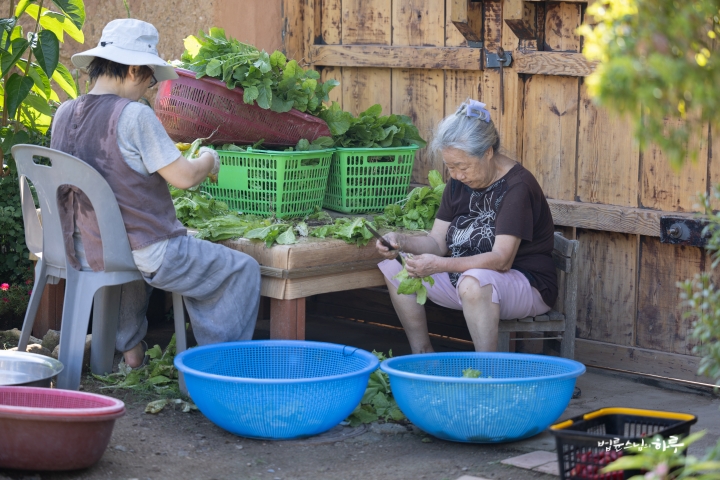

As they worked, the clouds cleared and the sun became scorching hot. Sweat poured down. Thinking of the laymen using weed trimmers in the blazing sun, Sunim took some refreshments and went back out to the rice paddy embankment.
“Have some refreshments while you work!”
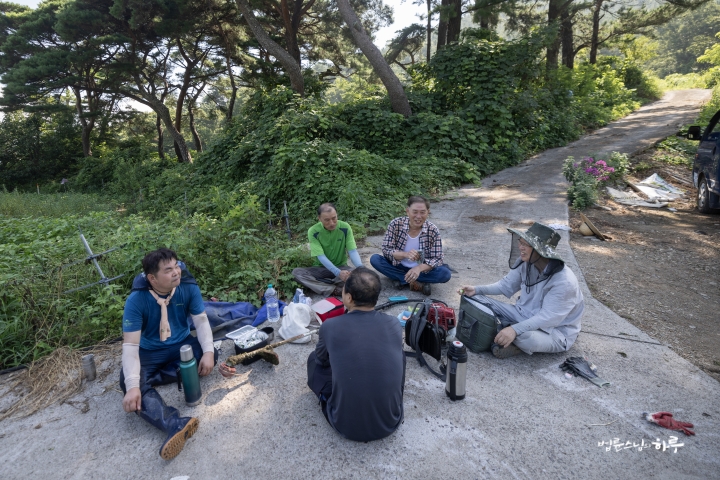
They sat in the shade of a tree, eating refreshments and cooling off for a moment.
“How did you all come on a weekday? Have you retired?”
“Some have retired, and some are self-employed.”
“Then let’s all go to Bhutan together. (laughs) If you’ve retired, you should become a monk now. You should fulfill the dreams you couldn’t achieve when you were young. When we travel around the world, we see there’s so much we can help with. If you go to the field, you’ll see clearly. We saw all this 30-40 years ago when we were in our 20s and 30s. There’s so much to do – houses need repair, roads and irrigation need fixing.”
“Sounds good.”
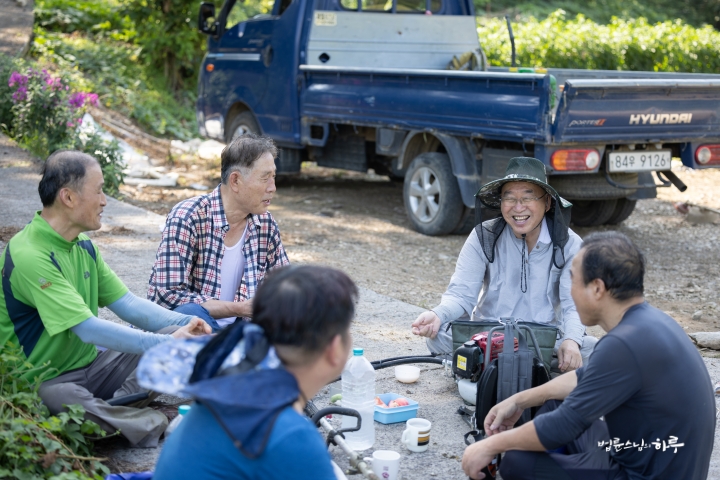
After finishing the refreshments, they resumed working together. Sunim couldn’t just leave, so he strapped on a weed trimmer and joined in cutting the grass. Text messages warning of extreme heat kept coming in on the mobile phone.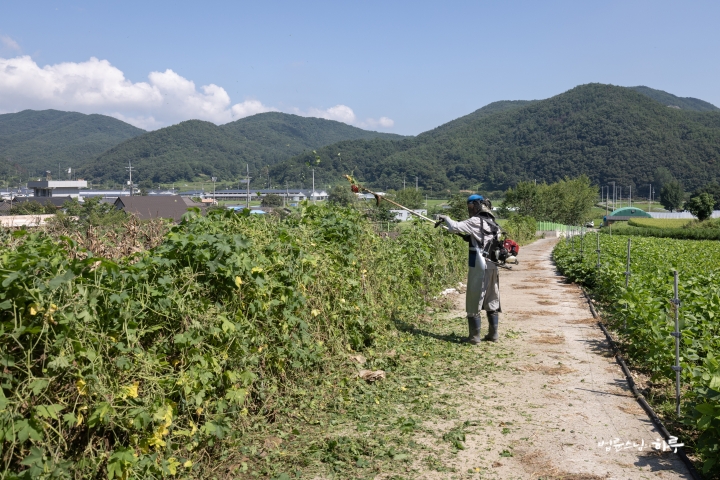
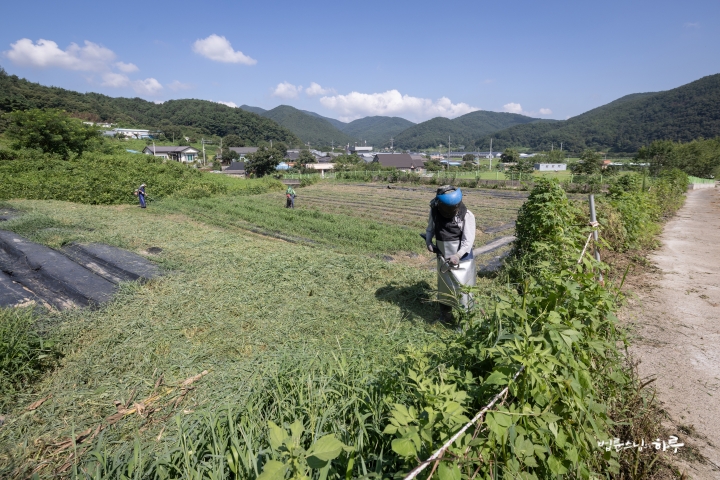

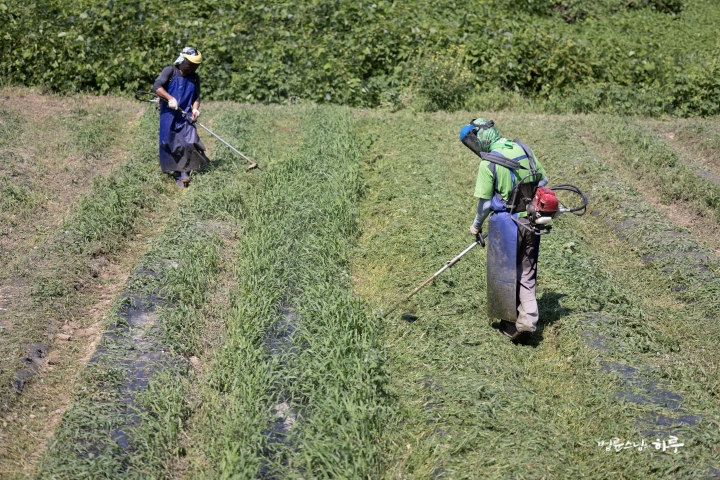
The fence netting kept getting caught in the weed trimmer line, so Sunim ended up cutting the grass with a sickle.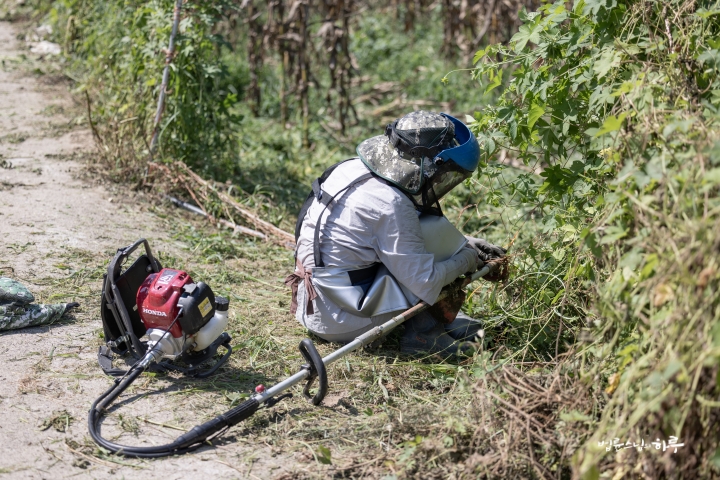
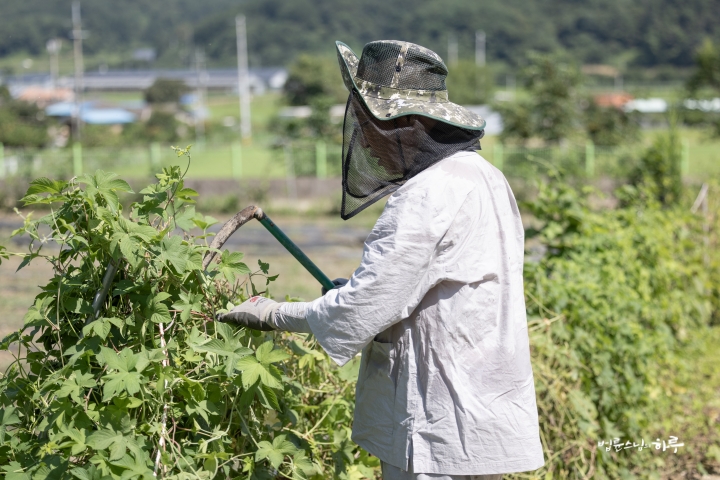
They hadn’t finished cutting all the grass, but it was too hot. Sunim said they should end the work session even if they hadn’t completed everything.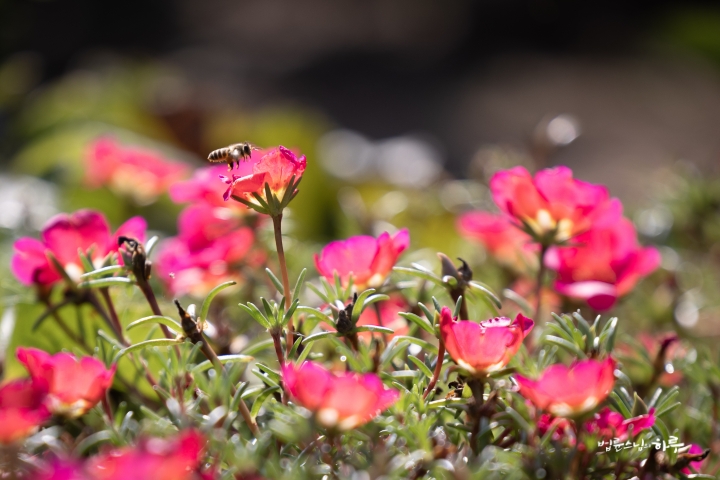
After finishing the work, Sunim participated online in the 16th Korean Minutemen for Peace and Unification Assembly starting at 2 PM. About 130 prospective Korean Minutemen who had completed the introductory course entered the video conference room, while senior Korean Minutemen connected via YouTube. The assembly began with everyone reciting the Words for Practice together.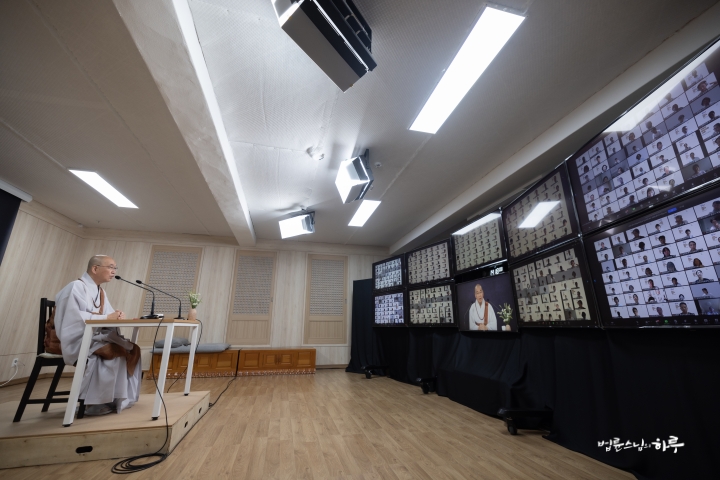
When the audience bowed three times to request a Dharma talk, Sunim explained the purpose of creating the Korean Minutemen for Peace and Unification and then spoke about the long history of our people’s roots.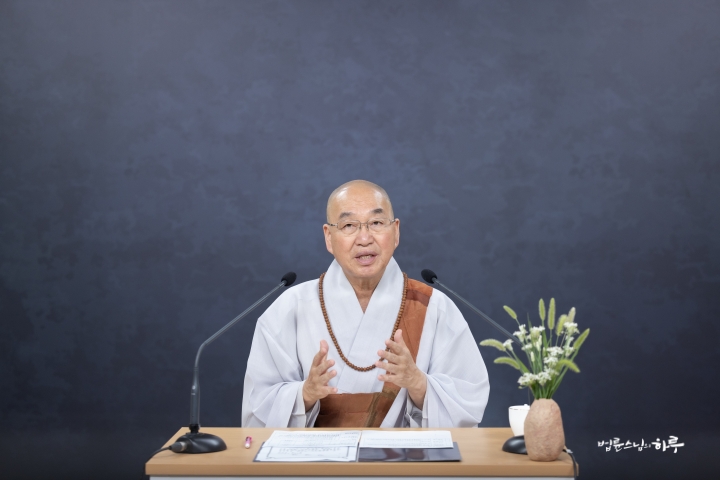
“Our people with a long history were forcibly annexed by Japanese imperialism in 1910. However, with the March 1st Movement in 1919 as a catalyst, the Provisional Government of the Republic of Korea was established, and a full-fledged independence struggle began. This struggle continued for a long time, but finally, with Japan’s defeat in 1945, our homeland was liberated. However, the joy of liberation was short-lived, as the Korean Peninsula was forcibly divided into North and South by the US and Soviet armies, and in 1948, two separate governments were established in South and North Korea. Even after several decades, the Korean Peninsula remains divided. Currently, we are living in an era of two Koreas, with the Republic of Korea and the Democratic People’s Republic of Korea coexisting, and we don’t know how long this division will last. Each side claims to be the legitimate heir of our national history and calls the other a puppet regime. After fighting like this, there have been movements to recognize each other and coexist peacefully, leading to simultaneous admission to the UN. But recently, tensions have escalated again, with both sides denying the other and calling them puppets, as if war could break out at any moment. ‘How can we peacefully resolve the crisis of war and gradually move towards a unified nation?’ This is the challenge of our time and the future.
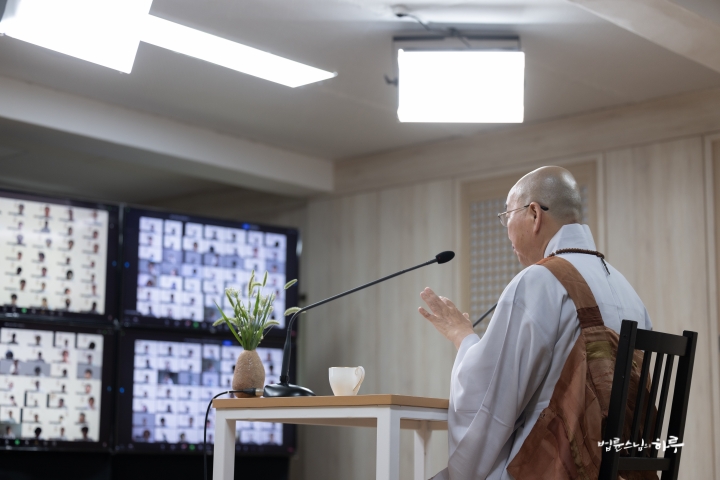
Towards a Republic of Korea That Gives Hope to the World
Currently, the Republic of Korea is showing praiseworthy achievements in various fields, ranking within the top 10 in the world. However, it is also a country where all of this could collapse overnight if a war breaks out. Despite being such a developed country loved by people around the world, the happiness index of the citizens of this proud Republic of Korea is among the lowest in the world, the suicide rate is the highest, and the birth rate is the lowest. The wage gap between men and women and the poverty rate among the elderly are still high. If we can overcome these negative issues, we can give great hope to many countries around the world. To do this, we need to think about how we can help struggling countries, how we can peacefully solve our own problems, and how we can contribute to world peace and human welfare. This aligns with the teachings of the Buddha. I hope you will continue your activities as Korean Minutemen for peace and unification with this positive attitude.”
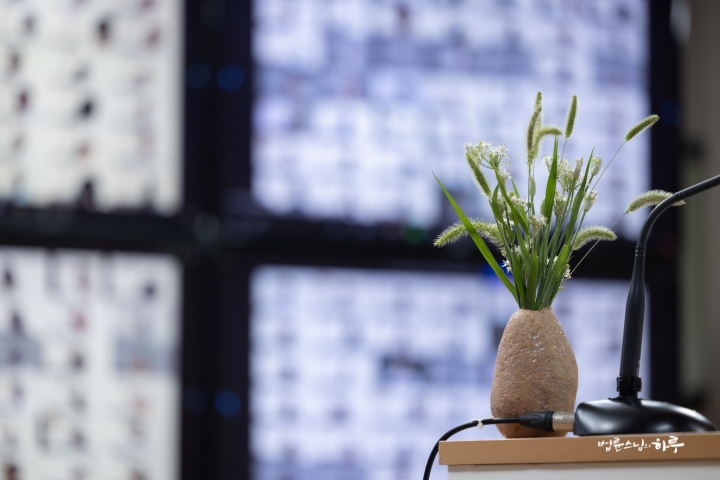
The prospective Korean Minutemen had completed the education for lead volunteers and studied our people’s history over five sessions to become Korean Minutemen. Five people pressed the raise hand button and had a dialogue with Sunim about questions that arose during the learning process.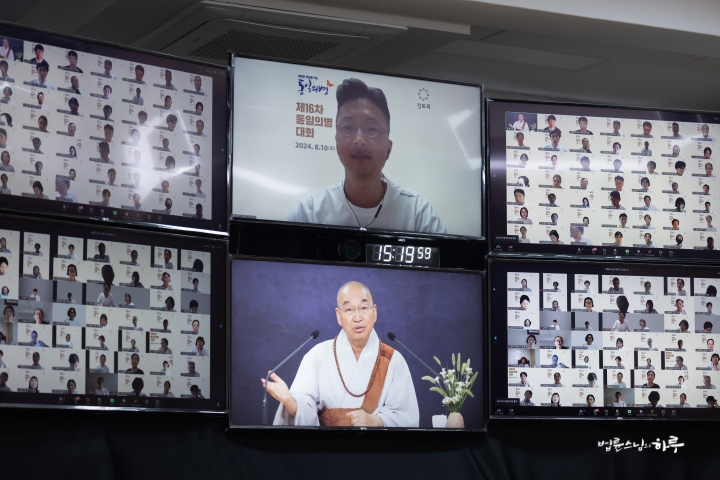
One of them said that seeing the South Korean and North Korean governments antagonizing each other as if they were about to go to war made them feel frustrated and distrustful. He asked Sunim for advice on what perspective to have and how to act as a Korean Minuteman for Peace and Unification (KMPU).
I Feel Frustrated Seeing South and North Korea Treating Each Other as Enemies
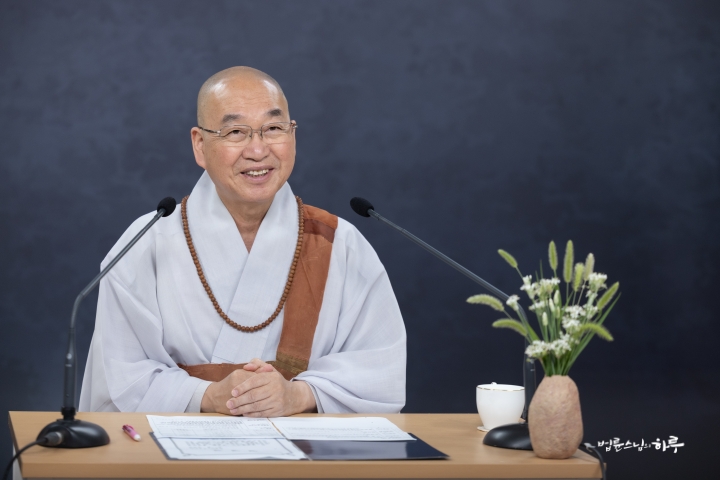
“The current Korean government is called a conservative government, isn’t it? The national strategy of a conservative government is to maintain power by gaining public support for the cause of ‘how to make South Korea safer’. This is not unique to our country; the national strategies of conservative governments in the United States and other countries are similar. While they always claim to act in the national interest when implementing policies, they are also constantly thinking about how to maintain their power. They believe that if North and South Korea reconcile and cooperate, it becomes unfavorable for conservative governments to stay in power.
The more intense the conflict between North and South Korea, the more the public tends to support conservative forces. Therefore, when a conservative government comes to power, it’s easier for tensions between North and South Korea to escalate. Progressive governments, on the other hand, tend to try to resolve conflicts through dialogue. However, from North Korea’s perspective, after experiencing this multiple times, they seem to have concluded that there’s only a slight difference between conservative and progressive governments in South Korea, and ultimately, they’re all the same. It’s similar to how we might feel that there’s a big difference between Democratic and Republican administrations in the U.S., but after long experience, we realize that they ultimately act in America’s interests, not necessarily in ours. So, just as Korea doesn’t pay much attention to which party is in power in the U.S., North Korea has reached a point where they don’t care much about which government is in power in South Korea.
During the previous Moon Jae-in administration, North Korea pursued unification policies with the South Korean government, but they were greatly disappointed when they saw that the South Korean government didn’t fulfill any of its promises. On top of that, when a conservative government came to power in South Korea and criticized the North Korean government, they decided to ‘cut off relations with South Korea. South Korea is not even the same people to discuss unification with’ and abandoned the idea of unification. Now that they no longer see South Korea as a target for unification, they’re saying, ‘Let’s live separately without interfering with each other. But if you keep provoking us, we’re not afraid of war.’ This is why tensions between North and South Korea are escalating.
Of course, the South Korean government is not entirely unwilling to improve relations with North Korea. However, for the public to support them, they need to feel that ‘we’ve resolved the issue very favorably for us.’ But if we resolve it favorably for us, it means it’s unfavorable for North Korea, and if North Korea resolves it favorably for them, we get criticized for always being led by North Korea. That’s why it’s difficult to solve the problem. If North Korea would cooperate in a way that’s favorable to South Korea, we would do it, but if not, it’s better to intensify the hostile relationship. This way, we avoid criticism of being led by North Korea and can even be praised for maintaining principles in North Korea relations.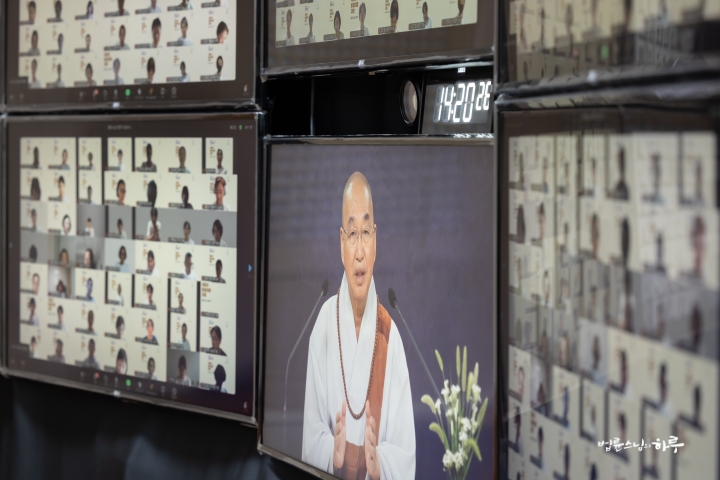
That’s why the role of the citizens is important. If there’s a clear public opinion that reconciliation between North and South Korea is beneficial, both conservative and progressive governments will adopt peaceful policies towards North Korea. It’s advantageous for maintaining their power. However, many of our citizens say, ‘We’re living better, why should we be led by North Korea?’ If many citizens support a tough policy when North Korea doesn’t listen, the South Korean government has no choice but to take a hard line. But if citizens clearly state that ‘War must not happen’ and if more people prefer peace, any government will have to adopt peaceful policies to win votes in elections. So while policies may change depending on the administration, ultimately, it depends on how aware the citizens are.
Firstly, both North and South Korea have judged that taking a tough stance is beneficial for maintaining their power if they can’t have their way. This makes the situation very dangerous. If either side backs down or makes concessions even a little, they’ll be seen as scared or all talk, so they become even more aggressive. Due to this psychological mechanism, as they respond more and more aggressively, it eventually leads to war.
For example, when two people fight, at first they might say ‘I’ll stab you if you mess with me’ just to intimidate, without actually intending to use a knife. But the other side, not wanting to lose, might stick out their chest and say ‘Go ahead and stab me if you dare.’ What started as mere intimidation escalates to a point where they feel they have no choice but to actually stab. This is how knife fights happen. They didn’t start with the intention of stabbing each other. The current North-South relationship is similar. No one wants war. They’re trying to intimidate, but as the other side doesn’t back down and keeps responding strongly, both sides keep escalating.
One side sends balloons with propaganda, the other side turns on loudspeakers criticizing the opponent, and as they continue to do what the other side tells them not to do, eventually someone might shoot at a loudspeaker, and one day a real local conflict could occur. This danger is lurking right now. Although neither the South Korean nor the North Korean government has the will to go to war, in my view, the possibility of war is growing.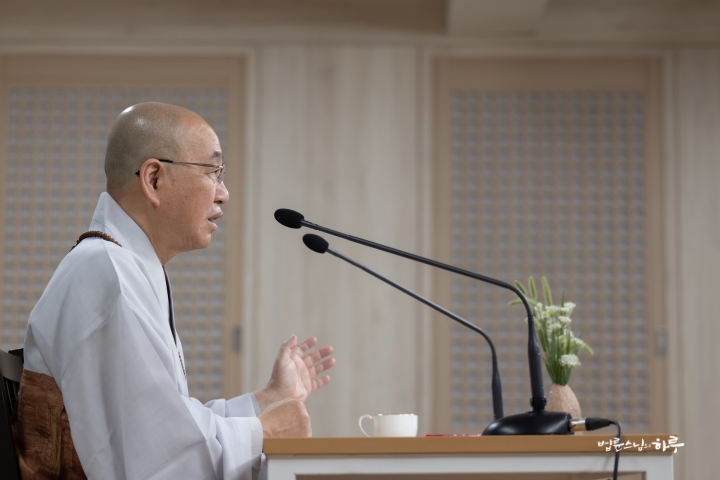
First, we need to speak out to prevent war from happening. We should stop sending balloons and turning on loudspeakers. Some people argue that we need to provide correct information to North Korean residents, but before providing information, we need to prevent the risk of war first. We need to awaken our citizens to recognize this fact. The consciousness that we must maintain peace needs to spread widely among our people. Today’s prosperity in our country is based on peace, but now that we’re living a bit better, quite a few people think, ‘Korean weapons are good these days, why don’t we just push North Korea hard and solve it in a week? Why do we keep leaving them alone?’ There are quite a few forces that are not afraid of war. We need to realize how foolish this thinking and response is and talk about it to those around us. So if opinion polls show that over 70% of people say ‘War must not happen. It’s not right to escalate tensions,’ policies will change accordingly.
If you include leading explanations in surveys like ‘Should we leave North Korea alone when they’re acting like that?’, ‘What should we do when North Korea sends balloons with trash?’, ‘Shouldn’t we send balloons with information for North Korean residents?’, then 70% of opinions might say ‘We should send balloons to North Korea.’ If you ask, ‘North Korea is sending balloons with trash, shouldn’t we turn on loudspeakers too?’, 70% of public opinion might agree. The government could be seen as misusing public opinion polls to worsen the situation.
But the recent behavior seems like an emotional fight with no benefits. A single careless word could bring about the enormous damage of war. It’s not just direct damage. Stock prices and real estate prices would plummet, and as foreign buyers leave, it would negatively impact the overall economy, including trade. Yet, like children playing with fire, they’re escalating conflicts saying ‘Let’s have a go now.’ I think we need to calm this escalating conflict even a little bit. It’s not that we’re calling for war now, nor has war broken out, but if we go out on the streets shouting ‘No to war,’ we might be misunderstood as forces making the public anxious. So for now, let’s focus on awakening ourselves first and playing a role in softening the hawkish public opinion around us. If a real local conflict breaks out, we could all gather in downtown Seoul for a peace rally against war.
We have a mission to protect the lives and property of the people living in this land and to maintain peace. In the current situation where tensions between North and South Korea are escalating, rather than being vaguely anxious, we need to pay attention to the situation, keep a close eye on it, and do what we can do now.”
“Thank you.”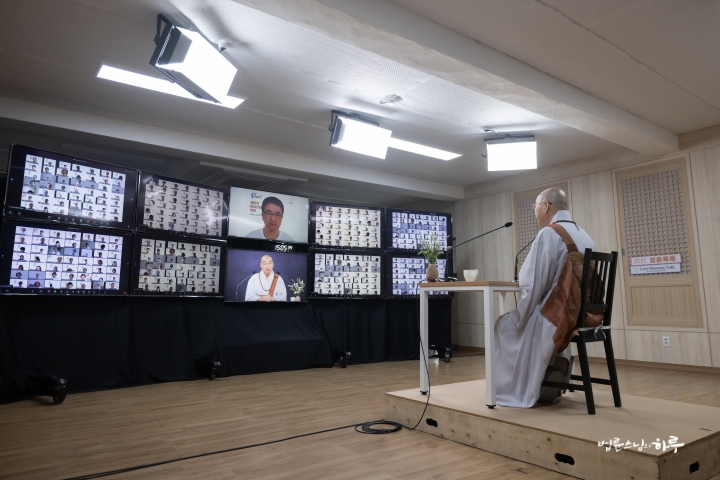
The questions continued. After all curiosities were addressed, the appointment ceremony for the Korean Minutemen for Peace and Unification (KMPU) was held. First, Sunim presented an appointment certificate to one person representing the new KMPU members.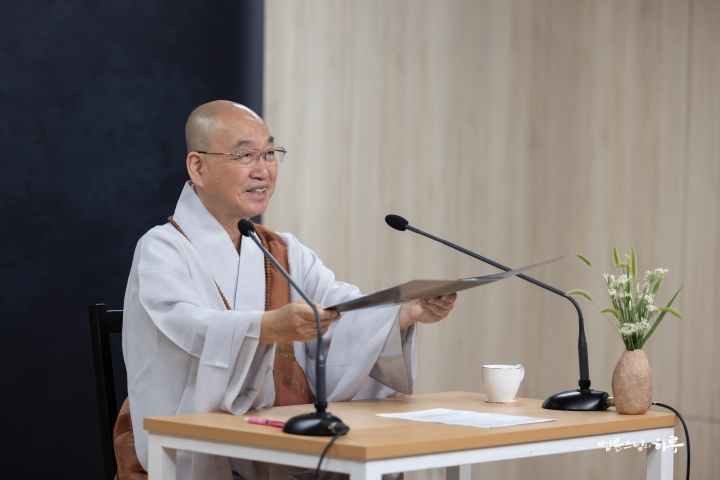
“This Jungto practitioner, having completed the introductory course for Jungto Society’s Korean Minutemen for Peace and Unification and having resolved to actively participate in the unification movement as a key player in peace and national unification on the Korean Peninsula, is hereby appointed as a Korean Minuteman for Peace and Unification.”
Then, Sunim presented appointment certificates to all new KMPU members.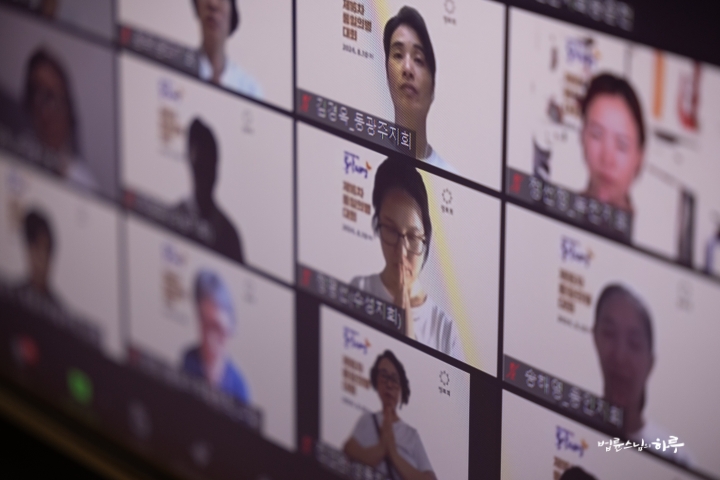
Senior KMPU members welcomed them with big applause. Then, Sunim offered a blessing prayer for the new KMPU members.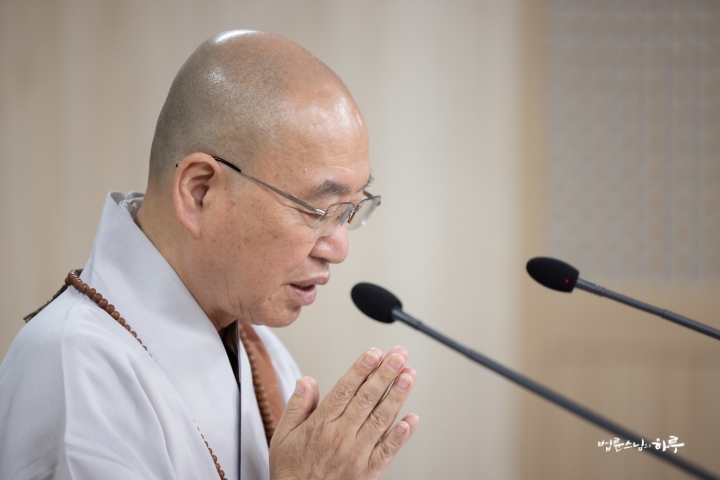
“All ancestors who have carried on our national history through generations! Spirits of those who have protected our country! We, 131 Korean Minutemen for Peace and Unification, join our hands and aspire with one heart today.
We, the Korean people with a glorious history and tradition, dream of building peace on the Korean Peninsula where there will be no more war, peacefully unifying our divided homeland into one country, and creating a unified Korea where our people from both North and South Korea and overseas Koreans can live together peacefully, holding hands and smiling at each other. A unified Korea is not just for our people. We aspire that a unified Korea will create peace in East Asia, and further, create world peace, and that the Korean people will greatly contribute to improving the welfare of people in poor countries. For the past thousand years since the fall of Goguryeo and Balhae, we have fallen into a weak nation and suffered all kinds of hardships. Now, if Korea is peacefully unified and contributes to world peace and the improvement of human welfare, this will be a way to resolve the historical resentment of the past thousand years and create new hope for the next 100 years.
Today, 131 Korean Minutemen for Peace and Unification, remembering painfully the fall of ancient Gojoseon and inheriting the spirit of our people’s volunteer army that has been passed down from the Damul Army that rose to regain national independence, to the independence army during the Japanese colonial period, to the industrial soldiers for the modernization of our homeland, and to the democratic martyrs who achieved democratization, firmly pledge to fulfill the historical mission given to us in this era. All Buddhas and Bodhisattvas, spirits of our ancestors, please watch over us! Namu Sakyamuni Buddha, Namu Sakyamuni Buddha, Namu Sakyamuni Buddha.”
Next, all KMPU members gathered their will and recited the KMPU pledge together.
“One. We will establish a peace system on the Korean Peninsula where there will be no more war. Two. We will open a unification era that will determine the next 100 years. Three. We aim for an East Asian community that coexists with neighboring countries…”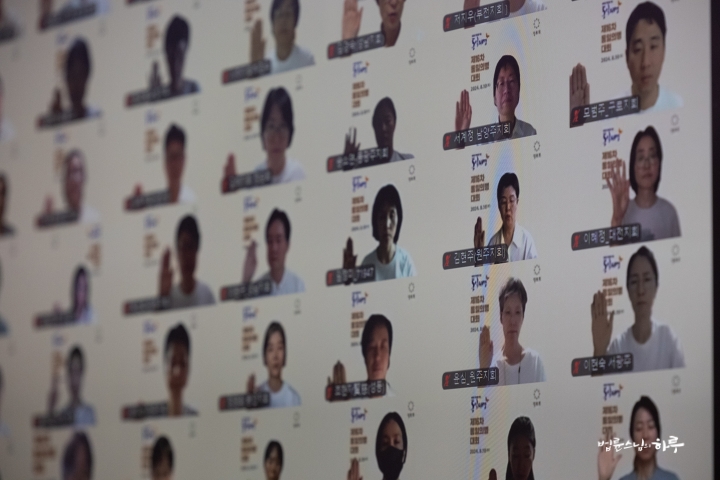
Finally, after reciting the aspiration, they sang “Our Wish is Unification” powerfully, gathering their hearts for unification, and concluded the KMPU assembly.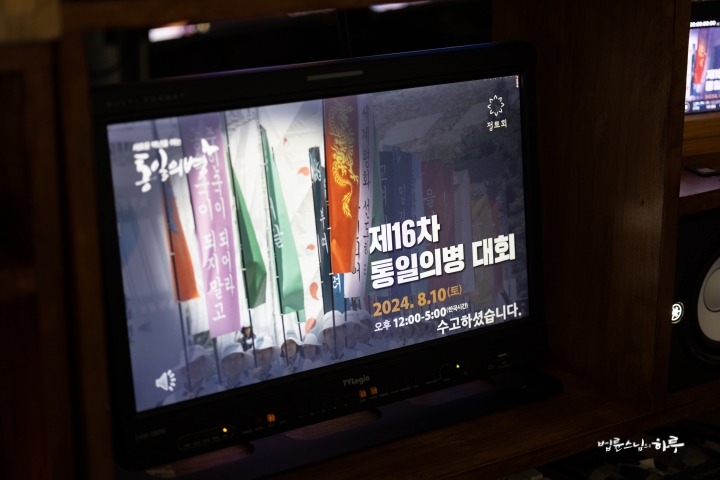
The new KMPU members continued to share their thoughts in group video conference rooms, while Sunim left the broadcasting room and departed from Dubuk Retreat Center for Seoul.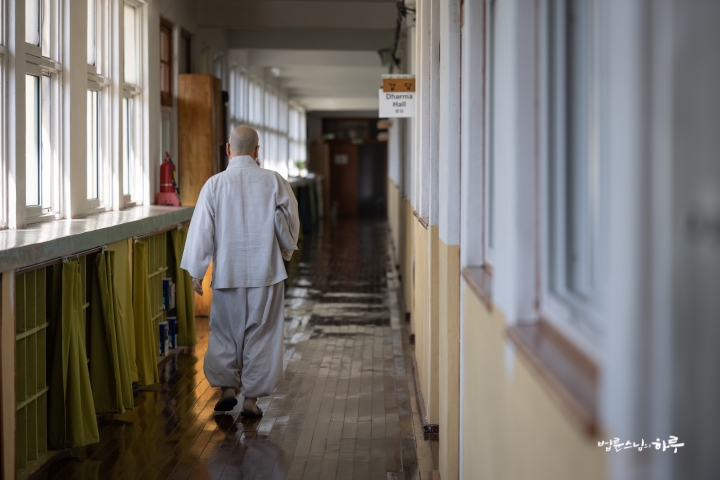
After driving on the highway for 4 hours, Sunim arrived at the Seoul Jungto Center at 10 PM and ended the day’s schedule.
Tomorrow morning, Sunim will conduct a live English Dharma Q&A for foreigners, give a commemorative Dharma talk at the Jungto Sutra Course graduation ceremony, and in the afternoon, hold a precept ceremony for those who have completed the leading member education.
A Day in the Life of Sunim is translated by AI, edited by volunteers




